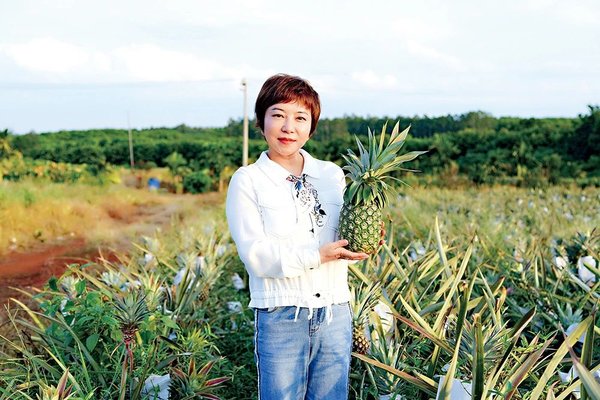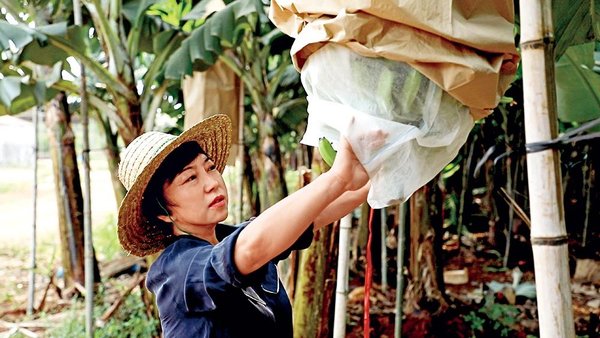Beautiful New Farmers | Sweet Business Boosts Rural Development

Xu Yongmei was born in 1967 in northwest China's Shaanxi Province. She was engaged in foreign trade, in New Zealand, for several years after she graduated from university (in 1990). In 1999, Xu arrived in south China's Hainan Province to pursue a career in agriculture. Since then, Xu has helped develop the region's tropical-fruit industry. She has also promoted poverty alleviation and rural revitalization in the region. In recognition of her efforts, Xu, in recent years, has received various awards and titles, including being named a National Woman Pacesetter for Achievements and a National March 8th Red-Banner Holder.
Fruit Farming
While engaged in foreign trade, Xu grew deeply impressed by the high level of automation in agriculture in that country. Over time, she developed plans to deliver advanced agricultural concepts and technologies to China, to help develop modern agriculture in her home country.
In 1999, Xu began managing a longan orchard in Lingao, an impoverished county in Hainan Province. That year, Lingao County suffered from frequent, disastrous weather events, and the longan harvest was poor. Some farmers suggested planting bananas would yield quicker profits, because the longan required a longer planting cycle. Following their advice, Xu began planting bananas. Lacking experience in banana cultivation, Xu had to learn everything from scratch. Xu's family and friends did not understand why she had abandoned her business career to get into agriculture. Xu stressed to the naysayers that agriculture, which allows for a unity with nature, would fill her heart with passion.
With passion, Xu began exploring an ecological production model. In 2001, Xu established Hainan Tiandiren Ecological Agriculture Co., Ltd. (Tiandiren), focusing on tropical-fruit plantations. She continued to expand the planting area for tropical fruits, and, by 2014, the banana planting area, contracted by her company, had reached more than 11,000 mu (733.33 hectares). Xu has since become a renowned "Banana Queen."
In 2014, Super Typhoon Rammasun made landfall in Hainan, and it resulted in huge losses to Xu's banana-planting base. Instead of retreating, Xu felt an even greater sense of responsibility on her shoulders. To resurrect her business, Xu convinced her family to sell their house and car, and she borrowed money from relatives and friends. Even as she faced such difficulty, Xu's firm belief in developing the local tropical-fruit industry never changed.

Pineapple Plantation Fosters Poverty Alleviation
In addition to running her business, Xu has always paid close attention to rural development. She has invested a significant amount of money and effort into poverty alleviation. Wherever she began operating orchards, she also made efforts to build rural infrastructure. To date, Xu has helped build 15 roads, nine bridges and 12 buildings. She has also drilled more than 20 wells, and sponsored more than 50 poor college students in Lingao County.
Xu has also participated in the national poverty-alleviation campaign, which began in 2015. Xu and her team carefully studied the local situation, and they decided to switch from planting bananas to planting pineapples. Xu believed harvesting pineapples would provide greater development prospects. Why? Pineapples taste good, are easy to cut and eat, and are easy to preserve and transport. Further, pineapple seedlings are resistant to poor soil and typhoons, and pineapples can easily adapt to the environment. Xu believed planting pineapples would result in considerable economic benefits.
In 2016, Xu conducted a trial; she planted 400 mu (26.67 hectares) of Golden Diamond pineapples in Chengmai, a county in Hainan. After the 18-month growth cycle, the pineapples were harvested. They were sweet and tasty, and they quickly became popular in the market.
In 2017, Tiandiren developed the Golden Diamond pineapple industry in Longlan, a village in Hainan. Since then, an increasing number of farmers have participated in the cultivation of Golden Diamond pineapples. Their individual incomes have increased significantly, and the appearance of Longlan has changed. In the years since, Xu has been introducing her pineapple-cultivation experience to other cities and counties in Hainan. With her assistance, more than 7,000 households, and more than 30,000 people, have escaped poverty.
Industrial Development Promotes Common Prosperity
As a woman entrepreneur, Xu strives to provide employment opportunities to women in Hainan. Tiandiren provides job opportunities to an estimated 50,000 people annually, and women make up nearly two-thirds of that workforce.
Xu believes industrial talents are the backbone of rural revitalization. Tiandiren has collaborated with local township governments to establish training schools, to teach modern-ecological-agriculture knowledge to rural people, especially to those in households registered as impoverished. Xu also encourages outstanding employees to transform themselves into business managers.
Tiandiren has built a tropical-fruit industrial system that includes numerous high-quality varieties of fruits, including pineapples, tropical pomelos, dragon fruits, and red guavas. As for the future, Xu plans to leverage her businesses to promote the integrated development of rural primary, secondary and tertiary industries, and to create new agricultural business models, such as rural tourism.
Photos from Interviewee
(Women of China English Monthly January 2025)
Editor: Wang Shasha
Please understand that womenofchina.cn,a non-profit, information-communication website, cannot reach every writer before using articles and images. For copyright issues, please contact us by emailing: website@womenofchina.cn. The articles published and opinions expressed on this website represent the opinions of writers and are not necessarily shared by womenofchina.cn.








.jpg)

 WeChat
WeChat Weibo
Weibo 京公网安备 11010102004314号
京公网安备 11010102004314号